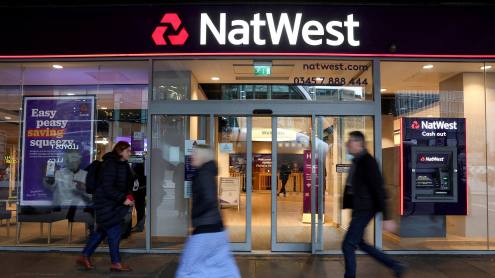The European Central Bank has hinted that it may consider cutting interest rates in June, citing a lowered inflation forecast for this year and 2025. Despite maintaining its benchmark deposit rate at 4 per cent, in a statement released on Thursday, the ECB lowered its eurozone inflation projection from 2.7 per cent to 2.3 per cent for the current year. It said it now expects inflation to fall to 1.9 per cent in summer 2025 and stay there until the end of 2026.
As reported by the Financial Times, ECB president Christine Lagarde indicated that a rate cut could be on the horizon in June, pending confirmation of economic data, especially wage data, and dismissed the notion that the central bank is in “no rush” to cut rates.
“We are making good progress towards our inflation target and we are more confident as a result,” Lagarde stated during a press conference. “But we are not sufficiently confident. We clearly need more evidence and more data. We will know a little more in April, but we will know a lot more in June.”
In comments emailed to journalists, Mark Wall, chief European economist at Deutsche Bank, said: “Given the revisions to the staff forecasts and the modestly changed wording to the statement, the ECB is inching closer to the first rate cut. It won’t surprise the market that the ECB is taking a meeting-by-meeting, data-dependent approach.”
Meanwhile, Michael Field, European market strategist at Morningstar, noted that: “With the European economy teetering on recession, we believe the ECB must now balance the outside risk of resurgent inflation, with the potentially more pressing need to ensure the economy doesn’t enter a prolonged recession. As such, June seems like a reasonable compromise for the first interest rate cut.”
—
The US banking sector experienced a 43.9 per cent decline in profits in the last quarter of 2024, largely attributed to fees paid to recover costs from several high-profile bank failures last spring. The Federal Deposit Insurance Corporation reported that 70 per cent of the profit decline was due to specific, non-recurring expenses, including a special assessment fee it imposed on larger US banks to shore up its deposit insurance fund.
The FDIC directed US banks with assets worth more than $5bn to pay fees to recoup billions of dollars in losses from its deposit insurance fund, following the failures of three US lenders: Silicon Valley Bank, Signature Bank and First Republic Bank. Banks with more than $50bn in assets would incur 95 per cent of the costs.
According to Reuters’ estimates, JPMorgan was expected to pay out $1.3bn in fees, followed by $1.1bn for Bank of America and $898mn for Wells Fargo.
For full-year 2023, bank profits fell by 2.3 per cent to $257bn, but remained above pre-pandemic levels, the FDIC said.
The FDIC also added eight banks to its “problem bank” list, increasing the total to 52. The agency does not disclose the names of banks; however, data indicates that this list accounts for just 1.1 per cent of the country’s total banking institutions, and the total assets of all the banks on the FDIC’s list amount to only $66bn.
“The banking industry still faces significant downside risks from the continued effects of inflation, volatility in market interest rates, and geopolitical uncertainty,” said the FDIC’s chairman Martin Gruenberg in a statement. “In addition, deterioration in certain loan portfolios, particularly office space and other types of commercial real estate loans, warrants monitoring.”
Read more: Uninsured deposits could pose a threat to financial stability
—
The UAE has launched the country’s first independent financial services ombudsman unit, Sanadak, which aims to safeguard consumer rights and address complaints related to financial institutions and licensed insurance companies.
Taking over consumer complaint-handling duties from the Central Bank of the UAE, Sanadak seeks to provide an efficient, impartial and transparent resolution process, which alleviates the legal burden on consumers by eliminating the necessity to pursue claims through courts and judicial authorities.
Commenting on the launch of Sanadak, Fatma Al Jabri, chair of Sanadak, said: “Sanadak is committed to safeguarding consumer rights, enhancing consumer satisfaction, and fostering financial inclusion and developing government services. This initiative aims to bolster competitiveness and drive substantial growth and stability within the UAE’s financial sector and the broader national economy.”
—
Abu Dhabi’s sovereign wealth fund, ADQ, has reportedly selected advisers, including HSBC, Citi, and First Abu Dhabi Bank, for a potential initial public offering of Etihad Airways, according to Bloomberg news yesterday citing sources familiar with the matter. Rothschild & Co will serve as an independent financial adviser to ADQ, the owner of the UAE’s national airline.
Etihad Airways CEO Antonoaldo Neves said on Wednesday that the airline has returned to profitability. He also highlighted ongoing efforts to enhance its transparency, governance, and improve its balance sheet, ahead of any potential IPO, if ADQ decides to proceed with listing it.
ADQ has been steadily listing its holdings since 2022, as part of its broader strategy to diversify the economy of the oil-rich emirate, deepen capital markets and stimulate investment.
—
Unicredit has been fined €2.8mn by the Italian Data Protection Authority for a massive 2018 data breach affecting approximately 778,000 of its customers. As reported by Reuters, Unicredit stated it would appeal the decision, asserting that no bank data was compromised and the incident was promptly resolved.
The cyber attack on UniCredit’s mobile banking platform led to the unauthorised acquisition of names, tax codes and identification codes for the affected individuals. The authority said its fine takes into account the broad impact of the data breach and its seriousness, as well as the timely adoption of UniCredit’s corrective measures.







